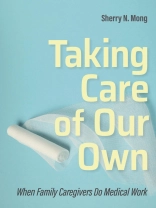Mixing personal history, interviewee voices, and academic theory from the fields of care work, the sociology of work, medical sociology, and nursing, Taking Care of Our Own introduces us to the hidden world of family caregivers. Using a multidimensional approach, Sherry N. Mong seeks to understand and analyze the types of skilled work that family caregivers do, the processes through which they learn and negotiate new skills, and the meanings that both caregivers and nurses attach to their care work.
Taking Care of Our Own is based on sixty-two in-depth interviews with family caregivers, home and community health care nurses, and other expert observers to provide a lens through which in-home care processes are analyzed, while also exploring how caregivers learn necessary procedures. Further, Mong examines the emotional labor of caregiving, as well as the identities of caregivers and nurses who are key players in the labor process, and gives attention to the ways in which the labor is transferred from medical professionals to family caregivers.
Tabla de materias
Introduction
Part I: The Work of Skilled Family Caregiving
1. The Work Caregivers Do
2. On-the-Job Training
3. Who Pays?
Part II: Relationships, Identities, and Emotions in Skilled Family Care Work
4. ntegrating Care Work with Life
5. ‘You Do What You Gotta Do’
6. Work Shifts
Conclusion
Sobre el autor
Sherry N. Mong is Associate Professor of Sociology and Criminology at Capital University in Columbus, Ohio.












